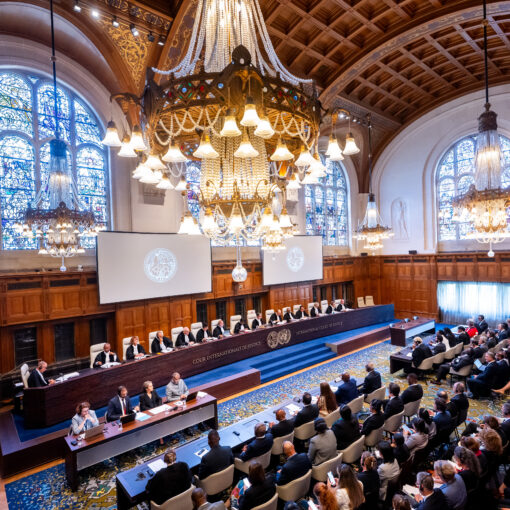
GRIDArendal on VisualhuntAntitrust – a previously dormant area of law and federal enforcement – has reached a new zenith in recent years. While progressives aim to reinvigorate the anti-monopoly origins of antitrust, some Republicans are weaponizing antitrust in service of their narrative and legislative anti-ESG campaigns.
Financial institution coalitions focused on responding to the market effects of climate change have been a particular target. From the outset, the notion that financial institutions are “boycotting” the fossil fuel industry – despite the fact that many targeted banks are leading financiers of fossil fuels – has animated Republican politicians advocating for anti-ESG legislation.
As these allegations of antitrust violations have risen to the fore, Republican Attorneys General have also taken aim at asset managers’ responses to ESG-related shareholder proposals.
It is important, amidst the flurry of investigative letters, legislative campaigns, and bombastic op-eds, to disentangle three conversations happening at the intersection of antitrust and ESG:
- Actions involving Financial Institutions – net-zero, climate, or ESG alliances and coalitions among financial firms, which involve purported “boycott” issues relating to disinvestment in fossil fuel industries.
- Republican state-level anti-ESG bills, many of which use “boycott” language, although key debates often center on fiduciary duties rather than antitrust principles.
- Other non-financial industry competitor collaborations – involving joint standard setting, joint ventures, information sharing, or various industry-wide collaborations, which may invoke competition concerns beyond boycotts, such as price fixing, output restrictions, or unfair methods of competition.
Most of the rhetoric and activity has occurred in the first two categories in the US, so we focus there, in an effort to differentiate political narratives from legal reality.
Contextualizing the visceral power of Boycott language
The term ‘boycott’ originated with the Irish land workers’ revolt of 1880. Charles Stewart Parnell, an Irish member of Parliament, organized a protest against unreasonably high rents and the mass evictions of tenant farmers, leading field workers to withhold their labor from an English land agent named Charles Cunningham Boycott. Boycott was eventually driven out of the country, and the practice of a concerted refusal to deal took his name.
The modern American notion of a boycott stirs the moral imagination, conjuring images of the 13-month Montgomery Bus Boycott, when Black citizens refused to ride on city buses in 1950’s Alabama, or the 1990’s consumer boycott of Nike to protest the company’s human rights violations. More recently, Nike’s support of Colin Kapernick and Black Lives Matter movement sparked a conservative #boycottNike pushback on social media.
The public intuitively understands that boycotts involve collective action. Boycotts are not the unilateral decision of one person to stop buying Nike shoes, but rather a movement which harnesses the collective power of a group to effect change. When we typically think about boycotts, we think of a group of determined citizens demanding societal or corporate change. However, what does it mean for a company – or group of companies – to participate in a boycott? What actions, and what changes, are inspired? And what are the permissible boundaries of that behavior? Antitrust law defines guardrails to address boycotts led by corporations.
What is a Boycott, according to antitrust law?
There are several statutes that form the basis of our antitrust laws. Sections 1 and 2 of the Sherman Act of 1890 establish the classic prohibition on unreasonable restraints of trade, including monopolization and other unlawful trade restraints. Section 5 of the Federal Trade Commission Act bars unfair methods of competition. And the Clayton Act of 1914 identifies additional prohibited conduct, including with respect to interlocking directorates, and mergers and acquisitions. Most states have parallel laws governing competitive behavior at the state level.
A key principle of antitrust law is that competing firms cannot collude to set prices or limit production. This is known as horizontal collusion, and it is considered a serious violation of the law. Indeed, the Supreme Court established Fashion Originators’ Guild of America v. FTC, 312 U.S. 457 (1941), that horizontal agreements are per se illegal even when based on good motives.
The term “boycott” under antitrust law refers to a specific type of horizontal agreement, where firms agree to take concerted, anti-competitive action against a competitor. Collective (or group) boycotts occur when two or more competitors agree to refuse to deal with a particular customer or supplier, usually attempting to drive them out of business, or force a change in practices. This is distinct from a unilateral refusal to deal: in accordance with another key precedent, United States v. Colgate & Co., 250 U.S. 300 (1919), businesses have a right to choose their partners (although such a refusal could, in rare cases, trigger antitrust liability if the exclusionary conduct has primarily anti-competitive effects).
Collective boycotts are considered anti-competitive because they reduce the number of potential suppliers or customers in a market, which can lead to higher prices, reduced innovation, and reduced consumer choice. Such refusals to deal are evaluated under the rule of reason analysis, which requires an examination of the unique facts of each case. This is distinct from per se anti-competitive behavior, like price fixing, which is considered outright illegal.
Commercial boycotts, intended to have an economic effect on a rival, are distinct from noncommercial, or politically-motivated, boycotts, which may involve similar conduct – a concerted refusal to deal – with a primary objective that is not economic in nature.
Cases like Allied Tube Conduit Corp. v. Indian Head, Inc., 486 U.S. 492 (1988), have helped distinguish between standard setting processes and economic boycotts. If a standard setting body acts in a way that is anti-competitive, by using the standard setting process to economically benefit certain industry players at the expense of others, this can invite antitrust scrutiny. However, many standard setting bodies are seen to have procompetitive benefits, including increased efficiency, as the DOJ & FTC Competitor Collaboration Guidelines explain: “The potential efficiencies from competitor collaborations may be achieved through a variety of contractual arrangements including joint ventures, trade or professional associations, licensing arrangements, or strategic alliances.”
Additionally, the Noerr-Pennington Doctrine gives antitrust immunity to private parties (both citizens and corporations) that engage in lobbying the government to adopt laws or rulings – even ones which may be anti-competitive. The First Amendment gives citizens a right to free speech and assembly, and “to petition the government for a redress of grievances.” For this reason, in certain cases, antitrust law’s goal of ensuring market competition can be overridden in favor of maintaining the right to petition the government.
The Weaponization of Consumer Protection
Republican Attorneys General have launched investigations into climate alliances, deploying boycott language to invoke the specter of antitrust violations. Prominent among their targets are financial coalitions led by the Global Financial Alliance for Net Zero (GFANZ), a global coalition of leading financial institutions “committed to accelerating the decarbonization of the economy” in line with the goals of the Paris Agreement.
Alabama’s Attorney General Steven Marshall recently testified before the House Committee on Oversight and Accountability that these climate alliance members are “required… to take common action” with respect to their assets, insurance policies, and other products. But the various GFANZ alliances have been clear that members act voluntarily and independently to establish and implement their climate goals. And as discussed above, information sharing, standard setting, and other such collaborative activities – including target setting – by trade organizations have long been permissible under US antitrust laws. Meaning, these alliances are unlikely to fit traditional antitrust notions of a boycott, and there is no case law that suggests these climate alliances are vulnerable under these theories.
If a boycott were used to exclude a specific competitor from the market, this would be considered anti-competitive. But, the financial institutions that participate in GFANZ do not compete with the companies that members finance or insure, making the legal arguments for anti-competitive behavior difficult to craft.
When professional associations have been found to violate antitrust laws, it is often because the conduct in question veers too closely to cartel behavior. Industry associations have always faced scrutiny under federal and state antitrust laws: these groups are designed to facilitate communication among competitors, and thus by their very nature invoke the specter of potential antitrust violations. Robust antitrust case law has developed to guide the behavior of trade associations and standard-setting organizations. Permissible behavior involves coordinated action that stays far away from coordinated pricing mechanisms.
Additionally, as currently interpreted in the US, antitrust law does not prohibit a “hub-and-spoke” structure unless: (1) it is functionally enabling the “spokes” to collude in a given market by sharing data, coordinating policies, and other forms of collusive activity; (2) it is facilitating monopolization, tying, or other illegal conduct by the “hub”; or (3) is actually motivated by some anti-competitive or monopolistic intent. (See, for example, the DOJ’s recent consent decree against Agri Stats, a consultancy that facilitated information-sharing and wage/benefit coordination between poultry processors, and the recent right-to-repair class action complaint against John Deere, which claims Deere organized a “group boycott” with its dealers by prohibiting them from sharing its repair tools with independent repair shops.) The financial institution climate alliances are, again, unlikely to fit these categories.
Perhaps in recognition that the grounds for antitrust violations are weak, recent Congressional testimony from Utah’s Attorney General Sean D. Reyes, tries to frame the Net Zero Asset Managers Initiative and Climate Action 100+ as asset managers which own more than 10% of a (utility) company and therefore act as “holding companies.” He proposes that the Federal Energy Regulatory Commission (FERC – a division of the Department of Energy) investigate these alliances.
Notably, Reyes’ argument is framed in terms of ownership concentration limits and horizontal agreements, and there is no mention of “boycotts” or even of horizontal shareholding, which is illegal under the Clayton Act. And while FERC has authority under the Federal Power Act (16 U.S.C. 791 et. seq.) and the Natural Gas Act (15 U.S.C. 717 et. seq.) to regulate mergers and securities acquisitions, those provisions do not involve the policing of anti-competitive behavior as proposed above. Taken together, this may be another indication that, as the antitrust case against these alliances is legally flawed, investigators may draw on more creative – and far-reaching – arguments to justify their inquiries.
ESG is Anything, to Anyone
Beyond targeting climate alliances, the ascendant “anti-ESG movement” takes advantage of the fact that “ESG” is now a catch-all term, employed by a wide variety of actors to mean distinct things: To a pension fund trustee, ESG may be a way of analyzing systemic risks – like climate change or governance issues at portfolio companies – which they believe have a material impact on financial returns. To asset managers with a sprawling universe of passive index funds, ESG may be a convenient marketing tool to charge more for largely undifferentiated S&P 500 trackers. Consumers may think that ESG is a way of doing well by doing good – investing their money in more sustainable companies. To politicians with an “anti-woke capitalism” agenda, ESG is a ploy to use the power of dominant financial companies to impose a progressive agenda.
As a result, the term “ESG”, lends itself easily to misinterpretation and attack. Despite, or because of, these linguistic challenges, the anti-ESG movement has proliferated in narrative potency in the media and in legislative efforts at the state level.
Boycotting the Boycotters: Attempts to Bolster the Fossil Fuel Industry
Under this anti-ESG banner, Republicans are pushing a range of legislative and enforcement actions in an attempt to prohibit financial “boycotts” which they claim harm citizens and taxpayers. Lurking behind this political fight, however, are links to fossil fuel lobbying groups and climate denial think tanks. These groups are funding this wave of legislation, which aims to undermine efforts to mitigate and prepare for the harms of climate change.
Law firm trackers follow the proliferation of anti-ESG bills, and significant analysis has been devoted to digesting the range of approaches evident across these bills and investigations. While variations and quirks abound, there are three main categories of bills: (1) bills that restrict ESG investing in public pension funds, requiring plan managers to make investment decisions solely based on purely financial, or “pecuniary,” factors; (2) bills that require financial institutions to limit the use, or disclose, ESG-related factors in connection with loan criteria; and (3) “boycott bills” that limit a state’s contracting authority with financial institutions that allegedly boycott fossil fuels, or other specified industries (such as timber, or gun manufacturers).
This final set of bills borrows the language of “boycotting” to target asset managers or banks doing business with state governmental entities. These anti-boycott bills target financial institutions that are perceived as disfavoring certain industries, like oil and gas, or firearms, due to “ESG considerations.” It is worth re-emphasizing that the deployment of this usage of “boycott” has little to nothing to do with how antitrust law treats commercial boycotts.
Early anti-ESG bills in Texas deployed boycott language to prohibit government entities from investing in companies that restrict funding to fossil fuel companies. This required state entities (including pension funds for teachers and government workers) to divest from 10 financial institutions (most notably including Blackrock, a particular target of the anti-ESG movement) deemed by the state Comptroller to be boycotting fossil fuel companies. They also required any financial company entering (or renewing) contracts with state entities to affirm they do not, and will not, boycott those companies.
The boycott laws currently in effect in Kentucky, Oklahoma, Texas, and West Virginia, use approximately the same language when defining “energy company boycotts,” to mean:
“without an ordinary business purpose, refusing to deal with, terminating business activities with, or otherwise taking any action that is intended to penalize, inflict economic harm on, or limit commercial relations with a company because the company:
- Engages in the exploration, production, utilization, transportation, sale, or manufacturing of fossil fuel-based energy and does not commit or pledge to meet environmental standards beyond applicable federal and state law; or
- Does business with a company described in subparagraph 1 of this paragraph.”
The boycott laws require state treasurers (or officers in similar positions) to prepare a list of financial institutions supposedly engaged in “energy company boycott” activities, and those financial institutions are then prohibited from doing business with the state. West Virginia was the first state to bar financial firms from engaging in new state business upon determination that they engage in boycott activities. The barred firms include BlackRock, Goldman Sachs, JP Morgan Chase, Morgan Stanley, and Wells Fargo. Texas, Kentucky, and others, most recently Oklahoma, have all released their own blacklists of financial companies prohibited from doing business with those states.
In all cases, the inclusion of a financial firm in these blacklists indicates that they will be subject to the various boycott laws’ divestment provisions. Numerous studies have been released that suggest these boycott measures will result in millions of dollars in losses for taxpayers and pensioners.
In each of these laws, the term “boycott” is more hyperbolic than illustrative. The financial institutions listed do not “boycott” energy companies in accordance with any legal definition of the term. Rather, they offer a suit of investment products, including some that apply ESG criteria or limit investment in fossil fuels. And, ironically, many of the targeted banks remain some of the largest fossil fuel investors in the world.
Imagining an actual Boycott of Fossil Fuels
The urgency of the climate crisis – and the harm caused by continued fossil fuel investment – is clear. Dire warnings from the Intergovernmental Panel on Climate Change – including what the UN Secretary General described as a “code red” for humanity in 2021 – have called for an end to new coal financing and new fossil fuel projects. It is clear financial institutions have not yet heeded the call, leading progressive activists to criticize asset managers and banks for not going far enough in their decarbonization plans.
Meanwhile, the GOP decries the same financial institutions for “boycotting fossil fuels.” It is a vivid illustration of C.S. Lewis’s famous line from The Last Battle: “by mixing a little truth with it they had made their lie far stronger.” And it prompts this interesting question: what would happen if financiers actually did refuse financing to new fossil fuel projects? Would a collective agreement to “boycott” specific industries, such as coal or oil and gas, expose them to legal risk?
There is growing concern over the role of the financial industry in contributing to the climate crisis. Financial institutions have enormous power to shape the economy and the environment: Investments drive economic growth, jobs, and innovation. The immensity of that power contributes to climate change when channeled into fossil fuels and other polluting industries. Financial institutions have been criticized for continuing to finance fossil fuel projects in the face of urgent need to transition to a low-carbon economy, leading to growing calls for financial institutions to collectively boycott oil and gas companies.
What is the solution? Financial institutions cannot coordinate their actions or agree on specific terms of the boycott, such as which companies to boycott or how much capital to withdraw, without drawing antitrust risk. However, a de facto collective boycott can be found legal under antitrust law when it is a result of market forces. Meaning, if financial institutions decide to cease doing business with oil and gas companies because they believe that the risks associated with investing in the industry are too great – as many pension fund managers are already concluding – this would not be considered collusion. It would simply be part of maintaining their long-term fiduciary duty. Such a scenario would have to arise from individualized decisions based on a firm’s own assessment of the investment risks and rewards – similar to the independent decisions already undertaken in the Net Zero alliances.
Ultimately, whether the “boycott” antitrust accusations are meritorious is up to the courts to decide, if and when a case is brought forward. However, financial institutions should not retreat in their efforts to decarbonize based on weak and far-reaching antitrust attacks ultimately financed by the fossil fuel industry. Ultimately, the GOP attacks are not about GFANZ concerns or about protecting consumers, they are about protecting the oil and gas industry from changing market realities.
This piece is part of a larger Antitrust & Sustainability project at the Columbia Law School and Columbia Climate School.






